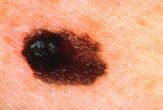New Blood Test Could Detect Spread of Melanoma

Researchers have found seven proteins that, when at high levels in the blood, can predict the spread of a certain type of cancer to other parts of the body, according to a new study.
The seven proteins — CEACAM, ICAM-1, osteopontin, MIA, GDF-15, TIMP-1 and S100B — were seen at elevated levels in the blood of 83 percent of people whose melanoma had spread to other organs, the study found.
However, the proteins were not seen at elevated levels in the blood of 76 percent of people with early-stage melanoma, indicating that they are only elevated when melanoma is more advanced and has spread, said study researcher Dr. Harriet Kluger, associate professor of medicine at Yale University School of Medicine.
Spread of cancer is currently detected with blood work (to examine liver function, blood cell counts and enzyme levels), X-rays and body scans, Kluger said. But the new study shows that proteins — called biomarkers, in the scientific community — that are produced by cancer cells could also give doctors information on cancer spread.
"Biomarkers would complement the other methods and might enable us, for example, to increase the interval between scans," Kluger told MyHealthNewsDaily. "There is no radiation with biomarkers as there is with scans, and they can potentially be more cost-effective."
Melanoma is the deadliest form of skin cancer, according to the National Cancer Institute. It is the fifth most common cancer in men and the seventh most common cancer in women. Melanoma is easily treated if caught early, and death risk rises once the cancer spreads to other parts of the body. Risk of cancer spread differs depending on the cancer stage.
The study was published today (April 15) in the journal Clinical Cancer Research.
Sign up for the Live Science daily newsletter now
Get the world’s most fascinating discoveries delivered straight to your inbox.
Specificity and reliability
Kluger and her colleagues tested the blood plasma of 216 people with melanoma. Half the people had melanoma that had spread to other parts of the body, and the other half had stage 1 or 2 melanoma, which had not yet spread to other organs.
Researchers found that most of the people with the melanoma that had spread had elevated levels of at least one of the molecular markers, but most of the people who had stage 1 or 2 melanoma did not have elevated levels of the markers.
Then, researchers used a statistical method that rates the reliability of a medical test — a value of 1 means a highly reliable test while a value of 0.5 means the test is useless.
The proteins scored a 0.898, which "is very good and superior to a number of tests that are currently being used in the clinic," Kluger said. "We strive, however, to improve the [value of the test] by adding other markers and fine-tuning the test."
What's at stake
Not all proteins in the study are newly identified, but this is the first time this particular combination of proteins has been tested to determine risk of cancer spread, Kluger said.
Researchers think the proteins are only detected once the cancer has spread because they are produced by the cancer cells, and it may be necessary to have enough of a mass of cancer cells in order to detect them in the blood, she said.
People in the study whose cancer had spread all had tumors that were big enough to detect with imaging, Kluger said. "Therefore, the proteins might or might not be related to the actual process by which these cells spread (this is not what we studied), but rather to the amount of malignant cells a patient has."
Next, researchers need to test the reliability of these proteins on patients who had early-stage melanoma (in which the cancer hasn't yet spread), who are then followed until their cancer has spread.
"Careful studies have to be conducted to ensure that the tests have added value to standard blood tests and imaging," Kluger said.
Pass it on: A blood test could, in the future, detect whether melanoma has spread to other parts of the body for people with the disease.
Follow MyHealthNewsDaily staff writer Amanda Chan on Twitter @AmandaLChan.
This story was provided by MyHealthNewsDaily, a sister site to LiveScience.

